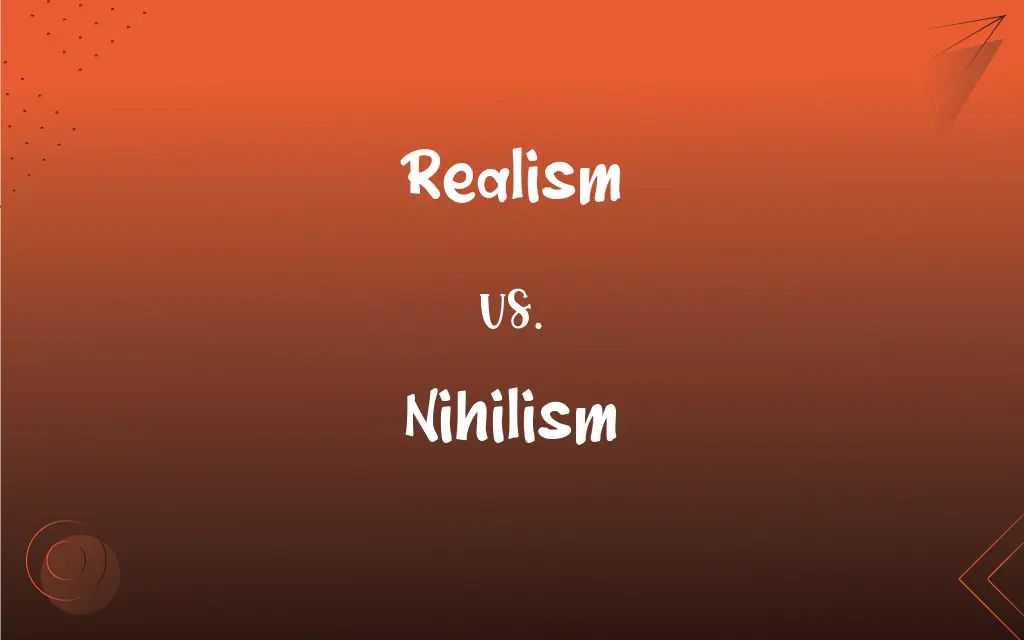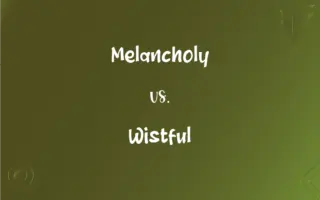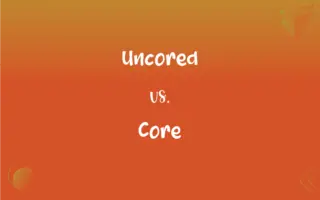Realism vs. Nihilism: What's the Difference?
Edited by Aimie Carlson || By Harlon Moss || Updated on February 5, 2024
Realism focuses on depicting life accurately, while nihilism believes in the absence of meaning or value in life.

Key Differences
Realism is an artistic, literary, and philosophical movement that aims to represent subjects as they are in real life, emphasizing detail, accuracy, and the unembellished depiction of nature or human life. Nihilism, in contrast, is a philosophical viewpoint that rejects or denies the existence of meaning, purpose, truth, or intrinsic value in anything.
Realism seeks to portray life and society accurately, focusing on everyday occurrences and the lives of ordinary people, while nihilism challenges the very notions of reality by asserting that life lacks objective meaning, purpose, or intrinsic value. Realism is grounded in the belief that reality can be understood and depicted as it is, often with a focus on social issues and conditions. Nihilism, however, posits that any such understanding or representation is ultimately meaningless.
In literature and art, realism is characterized by attention to detail, a focus on the mundane, and an avoidance of idealization, aiming to present subjects without embellishment or interpretation. Nihilism influences literary and artistic expressions by promoting themes of despair, existential angst, and the absurdity of the human condition, often challenging traditional narratives and values.
Realism, in philosophy, asserts that external reality exists independently of perception or language, suggesting that knowledge about the world can be objectively obtained. Nihilism confronts this idea by denying any objective basis for truth, arguing that knowledge, morality, and values are inherently subjective or constructed.
Realism and nihilism, though seemingly opposite, both engage with the nature of truth and reality. Realism attempts to capture and reflect the truth of human experience, while nihilism questions the possibility of any truth or meaning in that experience, reflecting a deep skepticism about the constructs of society and the human condition.
ADVERTISEMENT
Comparison Chart
Philosophical Foundation
Believes in the accurate representation of reality
Denies intrinsic meaning or value
Artistic/Literary Focus
Depicts life accurately, often focusing on everyday events
Emphasizes meaninglessness and existential angst
View on Truth and Knowledge
Asserts that objective knowledge of reality is possible
Rejects objective truths, viewing knowledge and values as subjective
Attitude towards Values and Morality
Often neutral, depicting human conditions as they are
Skeptical or dismissive of moral absolutes
Cultural and Social Engagement
Engages with social issues and conditions realistically
Questions the validity and significance of social constructs
ADVERTISEMENT
Realism and Nihilism Definitions
Realism
The portrayal of subjects as they actually are, without idealization.
The novel's realism brought the hardships of the working class to life.
Nihilism
The rejection of all religious and moral principles, often in the belief that life is meaningless.
Her lectures on nihilism challenged students to find their own values.
Realism
In art, a focus on depicting everyday scenes and people without embellishment.
Her paintings are celebrated for their realism, capturing the beauty of ordinary life.
Nihilism
In philosophy, the denial of any foundational existence.
His embrace of nihilism led him to question everything previously taken for granted.
Realism
A philosophical stance acknowledging an objective reality independent of human perception.
His commitment to realism was evident in his rigorous scientific research.
Nihilism
The skepticism regarding the significance of human achievements and the concept of progress.
The documentary's nihilism was evident in its critique of technological advancement.
Realism
In literature, the detailed depiction of ordinary characters and settings.
The realism of his dialogue made the characters feel like real people.
Nihilism
A viewpoint that traditional values and beliefs are unfounded and that existence is senseless.
The play's nihilism is conveyed through its characters' despair and inaction.
Realism
The belief in practical and realistic approaches to problem-solving.
Her realism in planning made the project successful despite limited resources.
Nihilism
The belief that life lacks inherent meaning, purpose, or value.
His novel explores nihilism through its disillusioned protagonist.
Realism
An inclination toward literal truth and pragmatism.
Nihilism
(Philosophy) The doctrine that nothing actually exists or that existence or values are meaningless.
Realism
The representation in art or literature of objects, actions, or social conditions as they actually are, without idealization or presentation in abstract form.
Realism
The scholastic doctrine, opposed to nominalism, that universals exist independently of their being thought.
FAQs
What is realism?
Realism is the depiction or conception of things as they are, without idealization or distortion.
What is nihilism?
Nihilism is the belief that life has no inherent meaning, value, or purpose.
What role does realism play in literature?
Realism focuses on accurate, detailed portrayal of everyday life and society.
Is nihilism always pessimistic?
Nihilism is often seen as pessimistic due to its denial of meaning, but it can also lead to a liberation from conventional values.
How does nihilism influence literature and art?
Nihilism influences themes of meaninglessness, existential angst, and the rejection of traditional values.
How does nihilism respond to the concept of truth?
Nihilism denies absolute truths, viewing perceptions of reality as subjective or constructed.
Can realism and nihilism coexist in art?
Yes, art can incorporate both realism in its depiction and nihilistic themes in its content.
How does realism approach social issues?
Realism often engages directly with social issues, depicting them in a straightforward, unembellished manner.
How do realism and nihilism differ in philosophy?
Realism asserts the existence of objective reality, while nihilism denies inherent meaning or value in life.
Is realism optimistic or pessimistic?
Realism is neutral, aiming to accurately represent life without inherent optimism or pessimism.
How do nihilists view progress and achievement?
Nihilists may view progress and achievement skeptically, questioning their ultimate significance or value.
What is the significance of detail in realism?
Detail in realism serves to enhance the authenticity and credibility of the depiction.
Do realism and nihilism have political implications?
Both can have political implications; realism by portraying social realities, and nihilism by challenging existing power structures and values.
How does realism affect the viewer or reader?
Realism can provoke reflection and empathy by presenting relatable, true-to-life scenarios.
What philosophical questions does nihilism raise?
Nihilism raises questions about the nature of existence, the value of life, and the foundations of knowledge and morality.
How does nihilism impact personal identity and purpose?
Nihilism can lead to reevaluation of personal identity and purpose, freeing some from conventional constraints.
What does nihilism say about morality and ethics?
Nihilism challenges the objective basis of morality and ethics, seeing them as socially constructed.
Can realism be subjective?
While realism aims for objectivity, its portrayal is influenced by the perspective of the creator.
Are there different types of realism and nihilism?
Yes, both realism and nihilism encompass various types and interpretations across art, literature, and philosophy.
Can realism be seen as a form of truth-telling?
Yes, realism is often considered a form of truth-telling through its accurate depiction of reality.
About Author
Written by
Harlon MossHarlon is a seasoned quality moderator and accomplished content writer for Difference Wiki. An alumnus of the prestigious University of California, he earned his degree in Computer Science. Leveraging his academic background, Harlon brings a meticulous and informed perspective to his work, ensuring content accuracy and excellence.
Edited by
Aimie CarlsonAimie Carlson, holding a master's degree in English literature, is a fervent English language enthusiast. She lends her writing talents to Difference Wiki, a prominent website that specializes in comparisons, offering readers insightful analyses that both captivate and inform.































































